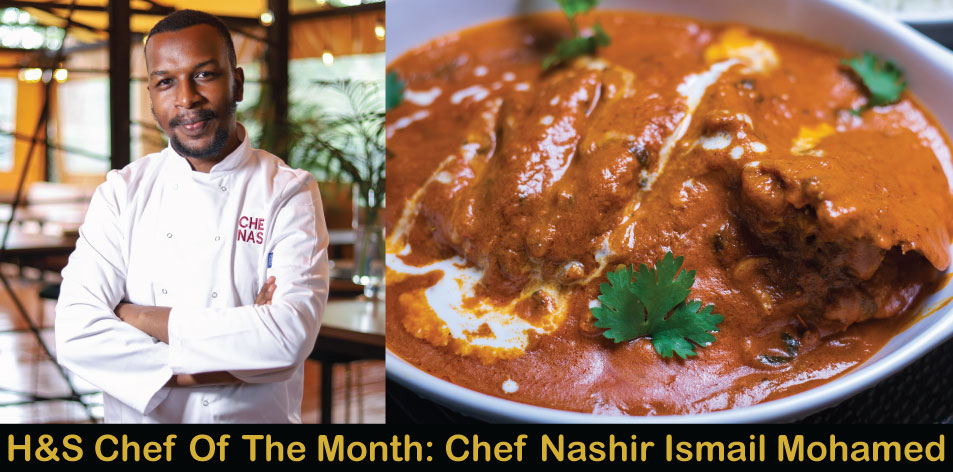
H&S Chef Of The Month: Meet Chef Nashir Ismail Mohamed
H&S Chef Of The Month

Chef Nashir Ismail Mohamed
Nationality: Kenyan
Interview With H&S Magazine
Who Is Nashir Ismail Mohamed?
I am a young Kenyan chef with an unrivalled passion for culinary arts. I recently graduated with a Bachelor of International Business in Culinary Arts (1st Honours) from César Ritz Colleges, Switzerland, and a Bachelor of Arts (2nd Honours) in Culinary Arts from the University of Derby, UK. As a creative, self-driven, ambitious, and disciplined individual, I bring excellent interpersonal skills to my work, making me a valuable team player in any culinary environment.
Type Of Cuisine?
My favourite type of cuisine is Indian cuisine. I am captivated by the fusion of different spices that create well-balanced and delicious dishes. The intricate blend of flavours and aromas in Indian cuisine never fails to
ignite my senses and bring joy to my culinary explorations.
What Inspired You To Become A Chef?
I was inspired to become a chef by my belief that cooking is a form of art. The ability to combine flavours, textures, and presentation to create memorable dining experiences for people fascinated me. The endless possibilities of experimenting with flavours and ingredients sparked my curiosity and led me on this incredible culinary journey.
What Is The Biggest Challenge You Have Faced In The Culinary Industry?
The biggest challenge I have faced in the culinary industry is learning to adapt and work with different chefs, customers, and individuals from diverse backgrounds. Additionally, striving to change people’s mindsets about food and culinary experiences can be a challenging task, as change is not always readily embraced.
What’s Your Biggest Achievement In The Culinary Industry?
One of my biggest achievements in the culinary industry was winning the Top Chef competition during my time in school. Additionally, I had the honour of being part of the selected team that cooked for His Highness The Aga Khan during his stay in Kenya a few years ago. These experiences have been instrumental in shaping my culinary skills and fuelling my passion for excellence.
When It comes To Cooking, What Is More Important To You, The Technique, The Ingredients Or The Creativity?
When it comes to cooking, technique holds the utmost importance to me. A solid foundation in culinary techniques ensures precision, control, and mastery of cooking methods. It enables me to bring out the best flavours and textures in ingredients, resulting in consistently well-executed dishes. While ingredients are essential, creativity allows me to push boundaries and create unique culinary experiences, technique remains the backbone
ensuring culinary excellence.
Recipe Of The Week: Swahili Fish Curry
 The Swahili Fish Curry
The Swahili Fish Curry
Ingredients:
• 500 grams white fish fillets, cut into chunks
• 1 Tbsp vegetable oil
• 1 onion, finely chopped
• 3 cloves of garlic, minced
• 1 tsp grated ginger
• 2 tomatoes, diced
• 2 Tbsp tomato paste
• 1 can (400 ml) coconut milk
• 1 Tbsp Swahili curry powder (or regular curry powder if unavailable)
• 1 tsp ground turmeric
• 1 tsp ground cumin
• 1 tsp ground coriander
• 1 tsp paprika
• Salt, to taste
• Fresh cilantro (coriander) leaves, for garnish
• Cooked rice or chapati, for serving
Preparation: The Swahili Fish Curry
Heat the vegetable oil in a large pan over medium heat, then add the chopped onions and cook until they become soft and translucent. Next, add the minced garlic and grated ginger to the pan & cook for another
minute, stirring frequently. Now, add the diced tomatoes and tomato paste to the pan & cook for a few
minutes until the tomatoes soften and start to break down. In a small bowl, mix together the Swahili curry powder, turmeric, cumin, coriander, and paprika and add this spice mixture to the pan and stir well to coat the onions and tomatoes. Pour in the coconut milk and stir to combine, bring the mixture to a gentle simmer. Next, gently place the fish chunks into the pan, making sure they are submerged in the coconut curry sauce. Cover the pan and let it simmer for about 10–15 minutes, or until the fish is cooked through and easily flakes with a fork. Taste the curry and season with salt according to your preference. Once the fish is cooked, remove the pan from the heat.
Plating
On a plate, serve the Swahili Fish Curry & Garnish with fresh cilantro leaves. Serve with cooked rice or with chapati.

